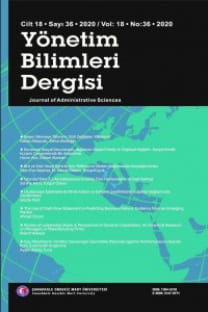Türkiye Bankacılık Sektöründe “Tersine Mentorluk” Uygulamaları
tersine mentorluk, mentorluk, kuşaklar, bankacılık sektörü, mentor, mentee
“Reverse Mentoring” Designs of Banking Sector in Turkey
Reverse mentoring, Mentoring, Generations, Banking sector, Mentor, mentee,
___
- Baily, Carol (2009), “Reverse intergenerational learning: a missed opportunity?”, AI & So- ciety , 23 (1), 111-115.
- Biss, J.L. and DuFrene, D. (2006), An Examination of Reverse Mentoring in the Workplace, Business Education Digest, 15, 30-41.
- Chaudhuri, S.and Ghosh, R. (2012). Reverse Mentoring: A Social Exchange Tool for Keep- ing the Boomers Engaged and Millennials Committed. Human Resource Develop- ment Review, 11(1), 55–76.
- Chen, Y.C.(2013).Effect of Reverse Mentoring on Traditional Mentoring Functions. Leader- ship and Management in Engineering. 13 (3), 199-208.
- Coles, M., Gardner, D. (2001). Young apprentices prove that they are the new-age masters. Sunday Herald, Business, 24.
- Coles, M., (2001). Listen to the voice of youth. Reverse mentoring is a new business concept whereby young recruits advise their elders and betters with a youthful take on the world. Evening Standard, General, p. 7.
- Eisner, S.P. (2005). Managing generation Y. SAM Advanced Management Journal, 70 (4), 4-15.
- Gill P., Stewart K., Treasure E., Chadwick B. (2008). Methods of Data Collection in Qualita- tive Research: Interviews and Focus Groups. British Dental Journal. 204, 291-295.
- Greengard, S. (2002). Moving forward with reverse mentoring. Workforce, 81 (30), 15.
- Harvey, M., and Buckley, M. R. (2002). Assessing the “conventional wisdoms” of manage- ment for the 21st century organization. Organizational Dynamics, 30, 368–378.
- Harvey, M., McIntyre, N., Heames, J. T., and Moeller, M. (2009). Mentoring global female managers in the global marketplace: traditional, reverse, and reciprocal mentoring. In- ternational Journal of Human Resource Management, 20, 1344–1361.
- Hewlett, S. A., Sherbin, L., & Sumberg, K. (2009). Let Gen Y teach you tech. Retrieved from http://blogs.harvardbusiness.org/hbr/hewlett/2009/06/let_gen_y_teach_you_tech.html
- Leh, A. S.C. (2005). Learned from service learning and reverse mentoring in faculty devel- opment: A case study in technology training. Journal of Technology and Teacher Education, 13 (1), 25-41.
- Lankau, M., and Scandura, T. (2002). An Investigation of Personal Learning in Mentoring Relationships: Content, Antecedents, and Consequences. Academy of Management Jour- nal, 45, 779–790.
- Meister, J. C., and Willyerd, K. (2010). Mentoring Millennials. Harvard Business Review, 88 (5), 67–72.
- Murphy, W.M. (2012). Reverse mentoring at work: Fostering Crossgenerational Learning and developing millennial Leaders. Human Resource Management, , 51 (4), 549–574.
- Pekala, N. (2001). Conquering the generational divide. Journal of Property Management, 66 (6), 30–38.
- Solomon, M. (2001). Coaching the boss. Computerworld, 35 (5), 42.
- Zielinski, D. (2000). Mentoring up. Training, 37 (10), 136-140.
- www.denizbank.com/en/about-us (Erişim Tarihi: 3 Mayıs 2016)
- http://www.ekonomist.com.tr/yonetim-kariyer/artik-gencler-ceolara-mentorluk-yapiyor. html (Erişim Tarihi: 3 Mayıs 2016)
- ISSN: 1304-5318
- Yayın Aralığı: 4
- Başlangıç: 2003
- Yayıncı: Yönetim Bilimleri Dergisi
Forecasting of Turkey’s Electricity Consumption with Support Vector Regression and Chaotic
Oğuz KAYNAR, Halil ÖZEKİCİOĞLU, Ferhan DEMİRKOPARAN
Avrupa’nın Önyargılarının ve Çelişkilerinin Bir Sonucu Olarak İslamofobi
Akademisyenlerde Tükenmışliğin Örgütsel
Taylan Özgür KAYA, Aslıgül Sarıkamış KAYA
The Challenges of Democratisation in Africa: Evidence and the Way Forward for Nigeria
Lere AMUSAN, Ademola JEGEDE, Luqman SAKA
Etik İklimin Örgütsel Bağlılık Üzerine Etkisi: Konya Küçük ve Orta Büyüklükteki İşletmeler Örneği
İlknur Çevik TEKİN, Adnan ÇELİK
Ekonomik Gelişmişlik-Kamu Harcamaları İlişkisi: 2007:1-2015:3 Dönemi Türkiye Örneği
